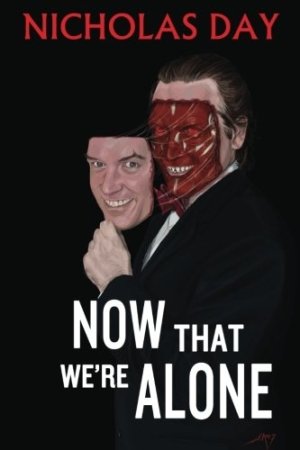
Now That We’re Alone
Writing is clipped and punchy; at times, it intentionally obfuscates, and its gory details are sure to set stomachs churning.
Nicholas Day’s short story collection Now That We’re Alone is a bizarre mix of makeshift golems, ghosts, and punk-rock cosmonauts. Not for the faint of heart, its stories are gruesome, bloody, and more than a little off-kilter.
In “Spoiling,” an encounter with a Satanist in interwar Poland leads to a curse on a newborn in the New World. “Beast Mode,” the collection’s longest story, is a cinematic werewolf tale about love, biker gangs, and human trafficking. “Chomp Chomp” tells the story of a gigantic and ravenous turtle that haunts the Mississippi River, while “GG Allin and the Final Flight of the Chrysanthemum Byzantium” is an almost nonsensical blast of modern-day mythologizing.
Stories avoid the more obvious trappings of slasher, murder, and supernatural tales. Day’s writing is intentionally odd, with stories like “The Ghosts in Winter’s Wake” and “Snow Like Lonely Ghosts” focusing more on atmosphere than plot. In other stories, like the neoclassic haunted house story “Jacks,” characters are depicted with only the fuzziest of outlines. The brevity of these short stories—few are over ten pages—helps Now That We’re Alone feel like a barely remembered nightmare.
Despite its murkiness, the short story collection contains some unifying themes. For instance, almost all of its characters can best be described as society’s losers—an isolated sugar addict, an aged gardener, and several cuckolds. Snow is also recurrent—not only because rural Illinois, the setting of many of the stories, tends to see much of it but also because winter is the dead season when depression and fear often commingle.
Interfamilial conflict forms the core many of the stories, with “Bright Red Mess” and “Negative Space” standing out from the tales about families who live on the farthest edge of sanity.
Writing is clipped and punchy; at times, it intentionally obfuscates. Four-letter words show up frequently, while adult themes, including sex, necrophilia, and blasphemy, also make several appearances. The book’s cover presents a gory spectacle that may churn more than a few stomachs.
It’s safe to say that you should make sure that Now That We’re Alone is kept far away from those under the age of sixteen. It is a unique and edgy collection of horror stories that is sure to appeal to literary fear junkies.
Reviewed by
Benjamin Welton
Disclosure: This article is not an endorsement, but a review. The publisher of this book provided free copies of the book and paid a small fee to have their book reviewed by a professional reviewer. Foreword Reviews and Clarion Reviews make no guarantee that the publisher will receive a positive review. Foreword Magazine, Inc. is disclosing this in accordance with the Federal Trade Commission’s 16 CFR, Part 255.
